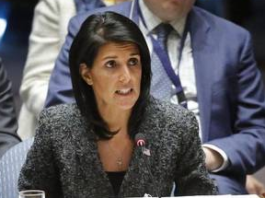
U.S President Donald Trump might take a proactive interest in deescalating tensions between India and Pakistan, U.S Ambassador to the U.N Nikki Haley has said. “We don’t think, we should wait till something happens,” Ms. Haley said at the U.N while taking over as chair of the U.N Security Council for two months.
“It’s absolutely right that this administration is concerned about the relationship between India and Pakistan and very much wants to see how we de-escalate any sort of conflict going forward,” she said in response to a question.
“We very much think that we should be proactive in the way that we are seeing tensions rise and conflicts start to bubble up and so we want to see if we can be a part of that,” Ms Haley said. “So I think that will be something that you will see members of the National Security Council participate in, but also wouldn’t be surprised if the President participates in that as well,” she said.
Ms. Hailey’s remarks about a “proactive” approach are at variance with the existing American position that it would involve only if both countries wanted it to. India has always rejected third party intervention in India-Pakistan relations, but U.S has been a constant factor between the countries. U.S pushes India to continue peace talks with Pakistan while it pushes Pakistan to take more effective measures against terrorism. Concerns of nuclear terrorism added a new dimension to the American interest in India-Pak conflict in recent years.
What is different about the Trump administration is that it is willing to appear more assertive and involved, and this may dissipate after initial enthusiasm, according to Indian diplomatic sources. In his early days in office, Barack Obama believed India-Pakistan rapprochement was essential for peace in Afghanistan also, an official recalled. Mr. Obama even toyed with the idea of U.S Special Representative for Af-Pak including India also in his ambit. “To lessen tensions between two nuclear-armed nations that too often teeter on the edge of escalation and confrontation, we must pursue constructive diplomacy with both India and Pakistan,” Mr. Obama had said soon after taking charge, talking about his Af-Pak policy.
Ms. Haley’s media interaction was not restricted to the UN Security Council and she took questions and made remarks about U.S national policy also. Her remarks about India and Pakistan were about the Trump administration’s thinking. The President is understood to have spoken about India-Pakistan conflict as a potential fillip to Islamist terrorism on several occasions.
Mr. Trump has offered to mediate between the two countries if both wanted, which is closer to the existing U.S position. Mike Pence was more upfront while he was Vice President-elect in December. He had said Mr. Trump’s “extraordinary deal-making skills” could resolve the Kashmir issue, noting that there was “great tension between India and Pakistan in recent days.” “It’s resulted in violence along the Kashmir region,” he had said.
Responding to Ms. Haley’s statement, by MEA Spokesperson Gopal Baglay said in New Delhi: “Government’s position for bilateral redressal of all India-Pakistan issues in an environment free of terror and violence hasn’t changed. We of course expect international community and organisations to enforce international mechanisms and mandates concerning terrorism emanating from Pakistan, which continues to be the single biggest threat to peace and stability in our region and beyond.”
Any reversal of the existing U.S policy of non-interference will be counterproductive, said Aparna Pande, Director, Initiative on the Future of India and South Asia at Hudson Institute in Washington. “The US policy of non interference on the issue of Kashmir, along with applying pressure- both public and private- on Pakistan to act against jihadi groups, has helped build closer US-India relations. This has served American interests in Asia, especially the Indo-Pacific region and Afghanistan,” she said. “Any reversal would only result in hurting ties with India, hampering efforts for peace in Afghanistan and encouraging Pakistan to continue its policy of using jihad as a lever of foreign and security policy and still not resolve the issue of Kashmir.”

























